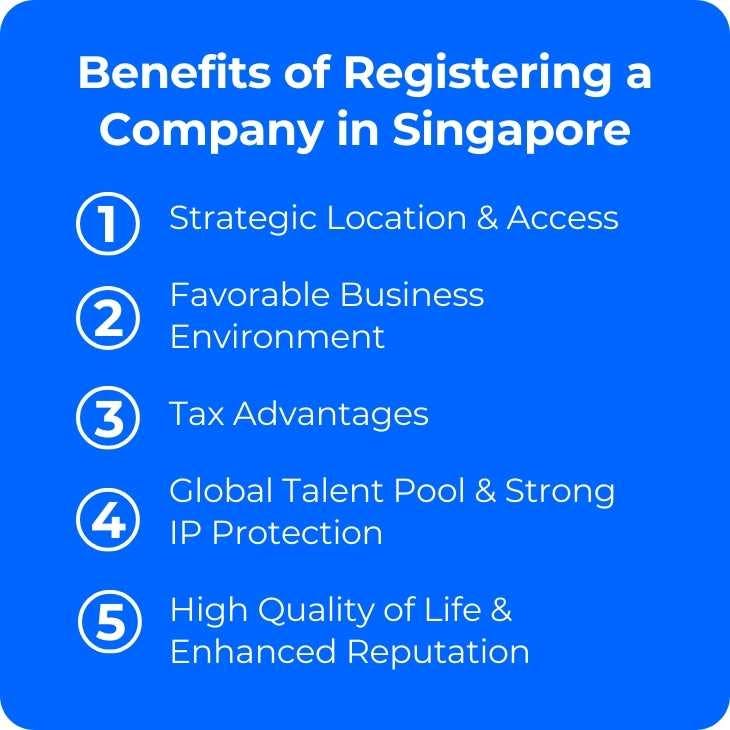- Choose a unique company name.
- Appoint at least one company director. At least one must be a Singapore citizen, Permanent Resident, or Employment Pass holder.
- Have 1-50 shareholders.
- Appoint a company secretary within 6 months (resident of Singapore).
- Provide a local Singapore registered address (not a P.O. Box).
- There is no minimum paid-up capital requirement.
- Draft a company constitution.
- Prepare and submit documents (IDs, address proofs).
- Pay the incorporation fee to ACRA.
- Submit documents for approval. Upon approval, a Unique Entity Number (UEN) is issued.
- Complete post-registration requirements (licenses, permits, annual filings).
Singapore is an international city with low taxes and no foreign exchange system, making it the preferred choice for many international businesses.
Registering a company in Singapore is fast and simple. Your company can be incorporated in a few hours, online and remotely.
You can start your company in Singapore with a minimum capital of SGD 1.
Your Singapore company will need a local director, which your incorporation agent can find for you.
After your Singapore company is registered, you can apply online for a corporate bank account. There is no need to travel to Singapore.
Starting a Singapore business is an exciting venture, thanks to its business-friendly environment and robust infrastructure. This step-by-step guide aims to simplify the process of Singapore corporate registration, making it easier for aspiring entrepreneurs to navigate the complexities and set up their businesses successfully.
Understanding Singapore Company Registration
Singapore Company Registration refers to the process of establishing a legal entity or business in Singapore. It allows individuals or businesses to set up and operate companies in accordance with the regulations and laws of Singapore. The registration process is typically facilitated by the Accounting and Corporate Regulatory Authority (ACRA), the Singapore government agency responsible for regulating businesses.
The Accounting and ACRA is the national regulatory body in Singapore responsible for the regulation of business entities and public accountants. Its role is multifaceted, covering various aspects of corporate governance, compliance, and transparency.
Types of Business Entities
Singapore offers various types of business entities, each catering to different business structures and needs. The choice of business entity depends on factors such as the nature of the business, the number of owners, and the level of liability protection desired. Here are the main types of business entities in Singapore:
Private Limited Company (Pte Ltd)
Description: A separate legal entity with shares owned by shareholders.
Key Features:
- Limited liability for shareholders; their personal assets are generally protected.
- Can have a maximum of 50 shareholders.
- More complex to set up compared to sole proprietorships and partnerships.
- Most common and preferred structure for medium to large businesses.
Sole Proprietorship
Description: A business owned and operated by a single individual.
Key Features:
- The owner is personally responsible for all business debts and liabilities.
- Simple and easy to set up.
- Suitable for small businesses and freelancers.
Partnership
Description: A business structure with two or more individuals (partners) managing and operating the business.
Key Features:
- Partners share profits and losses.
- Each partner is personally liable for the business debts.
- Can be a general partnership or a limited liability partnership (LLP) with limited liability for some partners.
Limited Liability Partnership (LLP)
Description: A partnership where each partner's liability is limited to the amount they invest.
Key Features:
- Combines elements of partnerships and private limited companies.
- Partners are not personally liable for the debts of the LLP.
- Suitable for professional services firms.
Public Limited Company (Ltd)
Description: A company that can offer shares to the public and is listed on a stock exchange.
Key Features:
- Can have an unlimited number of shareholders.
- Subject to more stringent regulatory requirements.
- Suitable for large-scale businesses seeking public investment.
Subsidiary Company
Description: A company where the majority of shares are owned by another company (holding company).
Key Features:
- The holding company has control over the subsidiary.
- Provides a level of legal and financial independence to the subsidiary.
Branch Office
Description: Extensions of foreign companies registered in Singapore.
Key Features:
- Not a separate legal entity from the parent company.
- The parent company is responsible for the branch's debts and liabilities.
Representative Office
Description: A temporary office established by a foreign company for market research and liaison purposes.
Key Features:
- Limited activities allowed, primarily for non-commercial purposes.
- Cannot engage in profit-generating activities.
The choice of business entity depends on factors such as the size of the business, the level of control and liability desired, and the business objectives. It is advisable to seek professional advice when deciding on the most suitable business structure for a specific situation.

Benefits of Registering a Company in Singapore
Registering a company in Singapore offers several benefits, making it an attractive destination for business incorporation:
- Strategic Location: Singapore's strategic location in Asia provides easy access to regional markets, making it a hub for international business.
- Political Stability: Singapore is known for its political stability and strong governance, providing a secure environment for businesses to operate.
- Robust Legal System: The country has a well-established legal system that upholds the rule of law, ensuring fairness and transparency in business dealings.
- Ease of Doing Business: Singapore consistently ranks high in global indices for ease of doing business, thanks to efficient regulatory processes and a business-friendly environment.
- Tax Benefits: Singapore offers a competitive and transparent tax regime with low corporate tax rates. There are also various tax incentives and exemptions to encourage business growth.
- Access to Global Talent: The country attracts skilled professionals from around the world, providing businesses with access to a diverse and talented workforce.
- Strong Intellectual Property Protection: Singapore has robust intellectual property laws and a commitment to protecting intellectual property rights, fostering innovation and creativity.
- Double Taxation Treaties: Singapore has an extensive network of double taxation avoidance treaties, reducing the tax burden on international businesses.
- Financial Hub: As a leading global financial hub, Singapore offers sophisticated banking and financial services, facilitating international trade and investment.
- Infrastructure and Connectivity: The country boasts a modern infrastructure, including excellent transportation and communication networks, supporting efficient business operations.
- Quality of Life: Singapore provides a high quality of life, with a safe environment, excellent healthcare, education, and a cosmopolitan lifestyle.
- Global Reputation: When you register a company in Singapore, you enhance the global reputation of your business, instilling confidence in customers, investors, and partners.
- Liberal Immigration Policies: The country has open and flexible immigration policies, making it easier for businesses to attract and retain international talent.
- Innovation and Technology Ecosystem: Singapore actively promotes innovation and technology, with government initiatives and support fostering a thriving ecosystem for startups and technology-driven businesses.
- Access to Funding: The availability of venture capital, private equity, and government grants provides businesses with access to diverse sources of funding.
These combined factors make Singapore an attractive and competitive destination for company registration, especially for businesses seeking a stable and business-friendly environment with global connectivity.
Singapore has competitive corporate tax rates and attractive tax exemptions for startups.
Requirements for A Smooth Singapore Company Registration Process
The process of registering a company in Singapore involves several steps, and it's important to ensure that you meet all the requirements to facilitate a smooth registration process. Here are the key requirements:
1. Company Name:
- Choose a unique and acceptable company name.
- Ensure that the proposed name is not identical or too similar to existing company names.
- Check for any reserved words or names that may require approval from regulatory authorities, such as “banking” or “insurance”.
2. Directors:
- A minimum of one director is required, and they must be at least 18 years old.
- Directors can be individuals or corporate persons.
- Directors can be of any nationality without any discrimination.
- At least one director must be a “local” director, meaning a Singapore citizen, a Singapore Permanent Resident, or an Employment Pass holder.
3. Shareholders:
- Singapore companies can have a minimum of one and a maximum of 50 shareholders.
- Shareholders can be individuals or corporate entities.
4. Company Secretary:
- Appoint a qualified company secretary within six months of company incorporation.
- The secretary must be a natural person who is a resident of Singapore.
- You may also work with a corporate secretarial firm to employ a company secretary.
5. Registered Address:
- Provide a local Singapore address as the company's registered address.
- The address must be a physical address and not a P.O. Box.
6. Paid-Up Capital:
- There is no minimum paid-up capital requirement.
- Companies can have authorized capital in any major currency.
7. Constitution:
- Draft the company's constitution, also known as the Memorandum and Articles of Association.
8. Documents Required:
- Prepare and submit the necessary documents, including identification and address proofs for directors, shareholders, and company secretary.
- Foreign documents must be officially translated into English.
9. Incorporation Fee:
- Pay the required incorporation fee to the Accounting and ACRA.
10. Approval and Registration:
- Submit the necessary documents and information to ACRA for approval.
- Once approved, the company will be officially registered, and a Unique Entity Number (UEN) will be issued.
11. Post-Registration Compliance:
- Fulfill post-registration requirements, such as obtaining necessary business licenses and permits (if applicable).
- Comply with ongoing regulatory obligations, including filing annual returns and financial statements.
Ensuring compliance with these requirements will contribute to a smoother company formation in Singapore. It's advisable to seek professional assistance, such as engaging corporate service providers or consulting with business advisors, to navigate the process more efficiently.
Timeline and Cost of Singapore Company Registration
Registering a company in Singapore involves reserving a name, typically taking a few hours, and the registration process with ACRA, which usually takes 1-2 days.
The cost for a name reservation is SGD 15, and the standard registration fee is SGD 300. Additional fees may apply if using professional services. There's no minimum capital requirement.
Consider the expense of renting office space, as a physical address is required. Miscellaneous fees may arise based on specific business needs. Actual costs may vary, so consulting with a professional service provider or business advisor is advisable for a more accurate estimate tailored to your circumstances.
Need help with Registration or opening a bank account? Let Air Corporate guide you through an easy company registration process!
FAQs
ACRA plays a multifaceted role, including overseeing the registration and incorporation of companies, maintaining the national business register, regulating various business entities, promoting corporate governance, and enforcing business laws.
The choice depends on factors such as the size of the business, the level of liability protection desired, and business objectives. It is advisable to seek professional advice for the most suitable structure.
Yes, Singapore welcomes foreign entrepreneurs and companies to register businesses. However, at least one local director and company secretary are required for company registration.




